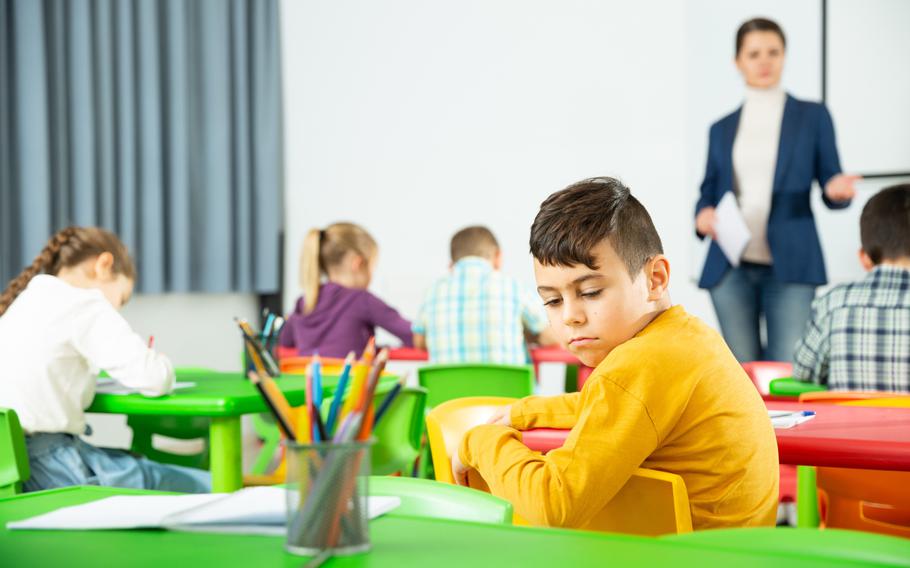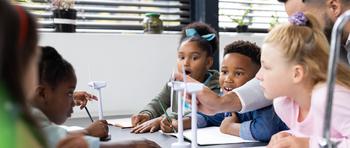Kids
Back to school and mental health awareness
Contributing Writer August 14, 2024

Tired schoolboy sitting in classroom (jackf (123RF))
The anticipation of the first day of school brings excitement to many students. However, for some, the anticipation of unknown challenges, past experiences and the pressure of expectations can be daunting. The transition from summer break to school can be a stressful time that impacts students’ mental health. It is crucial to address these challenges to ensure our children thrive personally, socially and academically.
Returning to school means facing unique stressors that children might have forgotten about over the summer break. The academic demands placed on students increase yearly, especially as they continue to grow. The large amounts of homework, exams, and projects, coupled with the fear of failure or underperformance, often lead to anxiety.
Military children face unique challenges during their back to school. The new school year can bring more sadness as they realize their friends have moved to another state or another country. Different educational systems can cause students to struggle to catch up or adjust to the new expectations, which leads to gaps or repeated work. Military children moving to a new country might struggle with new cultural norms, the language and adapting to the culture in general. In addition, the possibility of having a parent deployed on top of the physical distance from the extended family could increase anxiety and cause further challenges.

Students studying in a classroom (jackf (123RF))
Moreover, as students get older, their social lives become more complex. Making new friends, connecting, fitting in and dealing with social expectations are significant challenges. Difficult situations like rejection or bullying can potentially increase feelings of isolation and anxiety. Plus, the transition from summer creates disruptions to routines. Returning to school requires adjustments to new times, new schedules, early mornings, more structured days and less free time which can lead to stress and overwhelming feelings.
Over the last five years, the number of children aged 3-17 diagnosed with depression and anxiety has increased drastically. The most diagnosed mental disorders in children are ADHD, anxiety, behavioral problems, and depression. Some of these conditions are more likely to occur together, comorbidly. For example, among children with anxiety, more than one in three also have depression. These numbers increase as children face other conditions or experience adverse childhood events such as racial or ethnic discrimination and physical health issues. These statistics highlight the importance of proactive support in schools and communities.
Military children face many stressors with moves and family deployments that can also affect their school experience. Untreated mental health issues can have long-lasting effects on a student’s life. Poor mental health leads to underperformance academically, reduced participation in activities and extracurriculars and hindered overall development.
The role parents play in their children’s overall health is crucial. Our involvement fosters healthy development by opening communication, using effective communication skills, encouraging conversations about feelings, and ensuring students understand and differentiate their emotions. Parents should be aware of signs of distress and address them immediately.
School staff also play a pivotal role in supporting student mental health. Implementing counseling programs, mental health classes and teaching self-care are essential. Some DODEA schools in Germany such as Vogelweh Elementary School, have created “calm corners,” which are beneficial for regulating emotions. A “calm corner” provides a safe space where students can work through their emotions and return to class when ready, decreasing overall disruptions. Students can learn to take care of themselves through mindfulness exercises and physical activities through sports and healthy interactions.

Elementary schoolchildren and male teacher studying wind turbines in class (wavebreakmediamicro (123RF))
Prioritizing student mental health during the transition back to school is vital. Understanding and addressing the challenges and stressors they face, and working together to find supportive strategies and solutions is essential. School personnel and parents can collaborate to foster activities that promote overall well-being and address significant issues. Working together ensures our students succeed academically, socially, and personally.
It is important to seek help when needed. Military One Source provides free non-medical counseling for military members and families. Learn more at https://www.militaryonesource.mil/non-medical-counseling/. Children may also receive services through DODEA schools with MFLAC counseling. Learn more at https://www.militaryonesource.mil/benefits/military-family-life-counseling-program/.